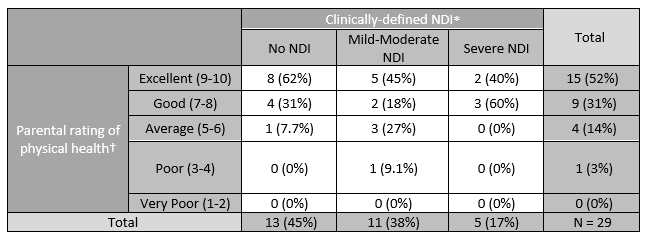Cardiology
Session: Cardiology 1
144 - Missing the point? Comparison between parental and medical perspectives of neurodevelopmental impairment in children born with congenital heart disease.
Monday, May 6, 2024
9:30 AM - 11:30 AM ET
Poster Number: 144
Publication Number: 144.3099
Publication Number: 144.3099

Lauren Capaci, MA (she/her/hers)
Physician Assistant Student
Nationwide Children's Hospital
Columbus, Ohio, United States
Presenting Author(s)
Background: Congenital heart disease (CHD) is the most common major congenital malformation and is associated with an increased risk of death and disability. Neurodevelopmental impairment (NDI) is generally labeled as severe, moderate, mild or none, based on medical definitions developed by clinicians without parental perspectives.
Objective: To determine family-important outcomes in critical CHD (CCHD) and describe the agreement between parents’ versus clinicians’/researchers’ perception of NDI.
Design/Methods: At a large, tertiary care center, parents of children born with CCHD (need for surgery or catheterization in first year postnatal) who were between 12-48 months old and came for their follow-up visit were invited to participate in an interview with closed and open-ended questions. Parents were asked to rate their child’s physical health and development, as well as give their perspectives regarding family-important outcomes. Children had a standardized assessment of neurological status, hearing and vision, and development with the Bayley scales, which allowed classification in different levels of neurodevelopment. Results were analyzed using mixed methods.
Results: 29/30 parental responses were obtained. The average age of children was 25.9 months, with 16 classified as having NDI. On average, parents rated their child’s health to be 8/10, even among children with clinically-defined moderate or severe NDI. 75% (12/16) reported their child’s health as being good or excellent (Table 1). Agreement between parental rating of NDI and clinicians was poor. Parents were more likely to describe their child’s development in a more positive way (Table 2). When clinicians described children as having mild-moderate NDI, 64% (7/11) of parents agreed; conversely, when clinicians evaluated children as having no NDI, 31% (4/13) reported their child as having mild disability. 86% of parents (n=25) reported their child’s CCHD diagnosis has had both positive and negative impacts on their family lives; with 7% (n=2) indicating only positive or only negative impacts. 52% (n=15) reported regrets and 41% (n=12) gave practical recommendations to providers.
Conclusion(s): Parents of CCHD infants report both positive and negative impacts of their child’s condition on their family’s life, independent of disability. Parental perception of neurodevelopment differs from medical classifications and may lead to an overestimation of moderate and severe disability and an under-reporting of minor disability by clinicians. Description of diagnoses and function, as opposed to a value-based classification, may be preferable.


